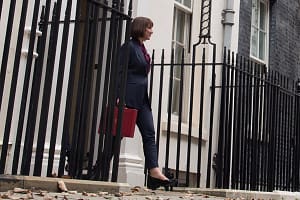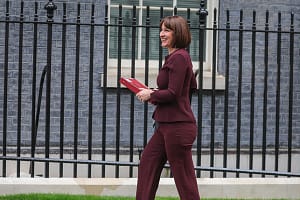Entrepreneurs and business leaders on what they want from 3 December
In July, Chancellor of the Exchequer George Osborne dented his reputation by ducking a simple maths question from a seven-year-old on live TV.
When Samuel Reddings asked the politician what 7 x 8 was, he replied: “I’ve made it a rule in life not to answer a whole load of maths questions…
“Of course there is a lot of maths in my job but it also about making judgements about where the government should spend its money.”
Well let’s just hope Osborne has done his maths for next week’s Autumn Statement.
But to be on the safe side, we asked entrepreneurs and business leaders what measures they want to see to boost enterprise.
“Merge PAYE & NI, simplify rates of tax” – Jon Moulton, founder & chairman, Better Capital:

“Obviously I’d love to see taxes cut because the government is spending less – however, this falls into the dream territory. So what could we get?
“How about simplification of taxation in a major way? The tax code has exploded this Parliament and much potentially useful brainpower is wasted in trying to interpret the increasingly incomprehensible – and failing. Top accounting tax advice is £1000 per hour now.
“Merge PAYE & NI; simplify or eliminate complex “reliefs”; cut rates and eliminate special deductions; and undertake to keep the tax system stable over the years ahead.
“Simplify the rates of tax – anything to make it easy to do business.
“Stability and simplification – these the Chancellor can deliver.”
“Get the exchange rates right” – John Mills, founder & chairman, JML Group:

“An absolutely key component of economic policy is to get the exchange rate right. This is the vital link which regulates our relationship with all the rest of the world. If the rate is at a competitive level, our economy will grow, there will be almost full employment, and we won’t need to run up debts to keep up our living standards. If it is too high, it will plunge the economy into slow or negative growth, high unemployment, mounting inequality, ever rising deficits and relative, if not absolute, national decline. Sounds familiar?
“If sterling is too strong for the good of our economy, which all the evidence certainly suggests it has been for a long time, this is mainly because any discussion of the exchange rate has simply dropped out of fashion.
“Amazingly a word search on the last two parliamentary debates on the Autumn Statement showed not a single mention of it. Not one. The Treasury produced a 100-page supporting document on each occasion and did this have anything to say about it? Yes, one mention on almost the last page in a table which said that it assumed that it would stay the same, with no discussion of the implications.
“This is madness. The exchange rate really matters. Parliament needs to discuss it. If it doesn’t do so, don’t be surprised if our overvalued currency makes our economy more and more unbalanced.”
“Overhaul business rates” – Liz Peace, chief executive, British Property Federation

“Creating a business rates system that is fit for the 21st century is one of the central challenges facing the next Parliament.
“There is now widespread agreement that the tax, designed to help businesses thrive by funding the essential local services upon which they depend, is now constraining business growth and discouraging investment.
“Unlike every other tax in the UK, the business rates burden does not fluctuate with the economic cycle, meaning businesses have to pay the same regardless of economic conditions and this, we argue, must change.
“Unless government acts, there may come a time when rates become so high that they squeeze investment out of all but our most prosperous towns and cities. This would be a disaster for the Government’s welcome aspiration to rebalance our economy and to bolster the role of regional cities as engines of local growth.”
“Commit to training and development” – Duncan Cheatle, founder, The Supper Club & Prelude Group:

“Corporate training and development is a crucial yet often overlooked part of sustainable business growth for UK firms. I would like to see a firm commitment from the Chancellor to encourage businesses to invest in these programmes.
“The UK has a wealth of rapidly growing entrepreneurial companies but when transitioning from start-up to growth firm, the needs of a business change dramatically and many businesses require some formal guidance or training to manage this growth.
“What’s more, greater investment in a business’s team will provide greater returns for a business and a more skilled workforce. By introducing tax breaks for growing firms that invest in formal leadership and staff training programmes, the government could unlock a huge amount of potential and go some way in ensuring our vibrant, entrepreneurial businesses are growing strategically and sustainably.”
“Introduce a ‘Business Allowance’” – Susanna Simpson, founder & MD of Limelight PR

“I would like to see the Chancellor introduce the Business Allowance. The Business Allowance, like it’s sister ‘The Personal Allowance’ which lets people earn £10,000 without paying tax, would let every business in the UK make a tax free profit of £100,000 each and every year.
“Designed to both help small business owners keep or reinvest what they have worked so hard for, and risked so much, as well the more mature business which wants to grow, the Business Allowance would be a radical tax change that will shake both the business and political world. The clever bit is that the BA is almost tax neutral.
“This is because the savings that will be made will either be spent on new staff (who will pay tax), or on more marketing (which will generate VAT) or for owner/management bonuses (who will pay tax).The new BA is a tax relief that will accelerate business instantly, produces massive good will, and costs virtually nothing.”
“Address the skills gap” – Tobi Schneider, CEO, Bouncepad and member of The Supper Club

“Britain’s trade deficit in the third quarter of 2014 amounted to £29bn, a sign that the makers are not marching and the budget will remain stubbornly unbalanced. Our business sources 50% of components from UK manufacturers and we would source 100% if it made business sense.
“Sadly, UK manufacturers have lost critical skills and cannot always deliver what we need, so
this is not just about waiting a few years for the Chinese to become expensive.
“Sourcing is not just about price; it is also about speed of delivery, flexibility, quality and payment terms. But first and foremost, you need to be able to get the job done.
“If the government wants to incentivise on-shoring and trigger a manufacturing renaissance, Obsorne needs to commit resources to bridging the skills gap.
“Bring our debt and deficit under control” – Michael Izza, chief executive, The Institute of Chartered Accountants in England and Wales

“We don’t think the Chancellor has leeway in the public finances to be radical in the Autumn Statement. That is why we are putting forward pragmatic, sensible solutions that, if implemented, will help bring our debt and deficit under control, and enable balanced and sustainable growth in the long term.
“Our ability to recoup tax receipts to balance the books is dependent on a successful and fully-functional HMRC. However recent mistakes have shown just how fragile HMRC is, and if its funding is cut any further it will have a major effect on service standards. This means that the proposed powers to directly recover debt should be delayed and reconsidered. HMRC must be able to collect tax receipts effectively but it needs extra support, not further draconian powers that could see even more mistakes.
“Our latest forecast suggests that growth will slow in 2015. Now more than ever, the Chancellor cannot take his eye off the ball when it comes to our debt and public finances. Tempting as it may be, he must avoid any short-term political land-grabs, and instead focus on practical measures that will help secure our economic recovery.
Got two mins to tell us how we can improve LondonlovesBusiness.com for you? Take our super-quick survey. Thanks!
Now read:













Leave a Comment